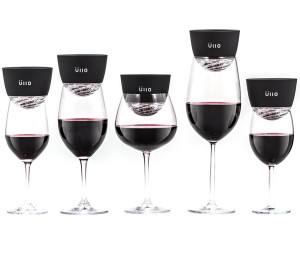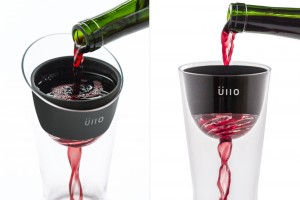Recently I have seen advertisements on Facebook about a device that takes the fear of hangovers away from drinking wine. Of course that sounds like a dream come true, but I wonder if this claim is scientifically based or just strategic marketing. The specific product that I am looking into is called Ullo. Ullo is a startup from Chicago with the mission of bringing wine back to its natural state. After watching Ullo’s story video, I learned several things. First, the creators of this product have chemistry or vineyard/ wine-making backgrounds which could make them more credible than someone with a total unrelated background. Second, I learned that their product attempts to trap the sulfites used to preserve the wine to bring the wine back to its natural taste. Lastly, their product is said to have an aeration function that can be turned on or off to add flavor, specifically to red wine. After hearing all of this, I think that their product sounds very appealing, but how valid are all of these claims?
Next, I decided to find some scientific sources to confirm that sulfites can act as a causal agent for hangovers or at least see if there is a correlation between amount of sulfites consumed and severity of hangover after drinking. On Google Scholar I found a post which discusses sulfites in wine and the trend of consumers paying more for sulfite-free wine. Since the 1980s, the FDA has required sulfites to be on wine labels because they can be hazardous to about 1% of the population. For these sulfite-sensitive consumers, sulfite intake can lead to difficulty breathing, skin rashes, and stomach pain. Typically, we associate hangovers with headaches, nausea, and fatigue so it is interesting that this article does not link any of those symptoms with sulfite intake. Although there is a very small number who are sulfite-sensitive, anecdotal evidence and articles show that a much higher percentage of the population reports headaches after drinking small amounts of sulfites. So we can not state that sulfites in wine is a direct cause of hangovers, but since many people have complained there could possibly be a correlation. There would also be confounding variables like amount of wine consumed, amount of water consumed to keep hydrated, variations in a drinker’s tolerance, other alcoholic drinks consumed on the same days, and others. Another scholarly journal article admits that the cause of hangovers are still unknown. Research on the topic has only used anecdotes and questionnaire-based approaches so I can not confirm that there is a direct causation between sulfite intake and hangover intensity.
When it comes to the topic of aerating wine, there is a patent for a method of aeration. This patent discusses the benefits and improvement of taste. I recognize that there may be some bias with a patent positively marketing its product. Unfortunately, when I looked for university studies or scholarly articles on the topic, there were not any substantial articles. I have had some difficulty finding proper research for this piece, but I have learned several things. It appears that scientists have not put much focus on researching sulfites in wine, wine taste or wine aeration. I think that there is a lot of room for research in this area, especially with wine’s popularity increasing with millennials. I can not draw a specific conclusion based off of the information that I found so all that I can do is leave a recommendation. Ullo’s wine purifiers are $79.99 which is expensive and that money could buy several bottles of wine. I do not think that a product at that price is worth it since the product is not 100% backed by science, but another option is using reviews as anecdotal evidence and deciding whether the investment is worth it. After all of this research, I cannot confirm or deny that Ullo’s products 100% work. Since the product is $79.99, I do not think that it is logical for a Penn State student to purchase the item. That is a lot of money for a product that only works based on a few consumer’s anecdotes.




Hangovers are definitely something that everyone suffers through at some point, so this is a very relevant topic to discuss! The reason why I personally wouldn’t invest in this “hangover preventing” device is because it seems too good to be true. If it actually was true, EVERYONE would have them because surely most people would agree that $80 is a small price to pay for a lifetime of drinking wine and not getting hangovers, especially considering how much money some people are willing to spend on fine wine.
Additionally, I don’t think it is fair to say that only one factor (sulfites) cause hangovers alone. The following link further discusses causes of hangovers, specifically congeners (which are heavily present in dark wines). Hopefully someone can develop some sort of mechanism that addresses these toxins as well in order to provide a better drinking experience for everyone! http://www.everydayhealth.com/healthy-living/why-do-we-get-hangovers.aspx
I also saw this device being shared among my Facebook friends and had very similar thoughts to what you had in your post. It seemed like an interesting device, but it had very little to back the claims about “no hangovers” and “better wine”. Overall, I think the idea of wine tasting might have some underlying problems with comparison and just how accurate it can be.
For one, there are many articles online disputing the claims that wines can be differentiated by quality, purity, and much more just from a few sips. One site, Real Clear Science, cites a study from a French PhD student, Frédéric Brochet. Brochet dyed a white wine with red food coloring in an attempt to deceive wine science students. The class was almost entirely fooled, believing the wine was the color it was dyed and not the original white. Overall, I feel that wine tasting can be very up for interpretation and I am not entirely convinced that someone could tell the quality difference even if they used the Ullo product.
For more info, here’s the source: Real Clear Science
This post immediately grabbed my attention because wine is one of my favorite things. I’ve heard about this device before this post and it does sound very appealing. No hangover and it preserves the natural flavor, who wouldn’t want this? But I agree with you in asking, how valid could these claims actually be. This product is targeted towards people with lots of money who drink wine every night, where the $80 on this product won’t make a huge difference in their pockets. I like how you broke down the parts of the wine and found out how it actually gives people hangovers. Overall, I really enjoyed it but I would change a few things. I would organize the post a little more by adding an introduction and conclusion in bold. I would highlight key words and add a citation towards the end.
Hey vek5025,
First, let me begin by asking you a question: Did you know that hangovers are caused by lack of water in the human body? When some one drinks alcohol, it dehydrates them; it almost seems you were not aware of this because you wrote about how the solution of hangovers has finally been solved when it was possible to avoid them altogether for some time now! Don’t believe me? Just read this article I found on drinking tons of alcohol but still avoiding the hangover:
http://dailyburn.com/life/health/how-to-avoid-a-hangover/
In addition, I wonder if there is a causation involved; you mentioned that correlation might play a role with the sulfite intake and hangovers, but does one necessarily cause the other? What about reverse causation? Just questions you might want to ponder about! Finally, I just wanted to agree with you that scientific evidence is not always necessary when making decisions in life; just like this aeration device you mentioned, just because there is no scientific evidence to show it works does not mean that that it simply does not work. Furthermore, anecdotal evidence, in this case, is definitely much more important!